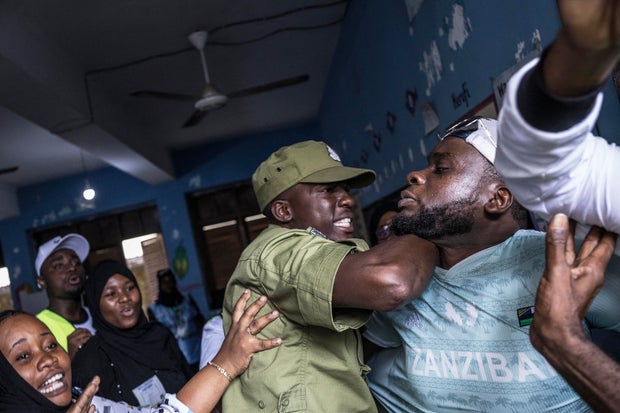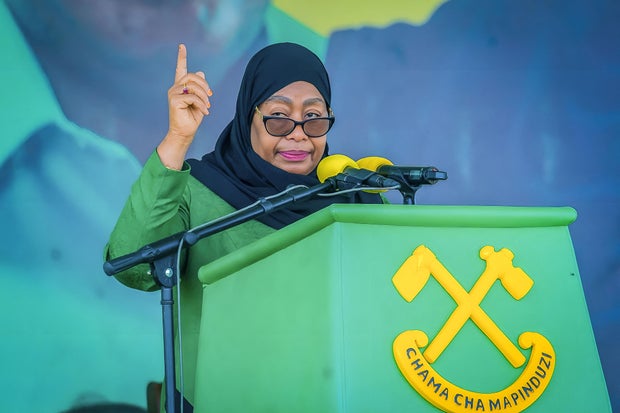Around 700 people have been killed in three days of election protests in Tanzania, the main opposition party said Friday, with protesters still on the streets in the midst of an internet blackout.
President Samia Suluhu Hassan had sought to cement her position and silence critics in her party with an emphatic win in Wednesday’s election, in which her main challengers were either jailed or barred from standing.
But the vote descended into chaos as crowds took to the streets of Dar es Salaam and other cities, tearing down her posters and attacking police and polling stations, leading to an internet shutdown and curfew.
MARCO LONGARI/AFP/Getty
With foreign journalists largely banned from covering the election and a communications blackout entering its third day, information from the ground has been scarce.
The main opposition party, Chadema, said clashes continued between protesters and security forces in the commercial hub on Friday.
“As we speak the figure for deaths in Dar (es Salaam) is around 350 and for Mwanza it is 200-plus. Added to figures from other places around the country, the overall figure is around 700,” Chadema spokesman John Kitoka told the French news agency AFP.
“The death toll could be much higher,” he warned, saying killings could be happening during the nighttime curfew.
A security source told AFP they were hearing reports of more than 500 dead: “Maybe 700-800 in the whole country.”
“We are talking hundreds of deaths,” a diplomatic source told AFP.
The United Nations said “credible reports” indicated 10 dead, in the first information released by an international body.
“We are alarmed by the deaths and injuries that have occurred in the ongoing election-related protests in Tanzania. Reports we have received indicate that at least 10 people were killed,” U.N. human rights office spokesperson Seif Magango said, according to the Reuters news agency.
Amnesty International said it had information about at least 100 people being killed.
Multiple hospitals and health clinics were too afraid to talk directly to AFP.
Hassan had yet to comment on the unrest and local news sites had not been updated since Wednesday.
MICHAEL JAMSON/AFP/Getty
The only official statement came from army chief Jacob Mkunda late Thursday, who called the protesters “criminals.”
In Zanzibar, a tourist hotspot island with its own semi-autonomous government, a spokesman for Hassan’s Revolution Party (Chama Cha Mapinduzi, or CCM) said internet access would be restored when the situation calmed down.
“The government knows why they have shut the internet. There are people who have tried creating tension in Dar es Salaam and they have destroyed a lot of things,” party spokesman Hamis Mbeto told reporters.
‘They have robbed the people’
In Zanzibar, the CCM had already been declared winners of the local vote on Thursday. The opposition party, ACT-Wazalendo, rejected the result, however, saying: “They have robbed the people of Zanzibar of their voice … The only solution to deliver justice is through a fresh election.”
A senior party official told AFP that ballot boxes had been stuffed, people allowed to vote multiple times without showing IDs and election observers kicked out of counting rooms.
At a meeting place for opposition supporters in Zanzibar, there was dismay and fear.
“There has never been a credible election since 1995,” said a 70-year-old man, referring to Tanzania’s first multi-party vote.
None of those interviewed gave their names.
“We are afraid of speaking because they might come to our houses and pick us up,” said another.
Analysts say Hassan wanted an emphatic victory in this week’s election to cement her position, and the authorities banned the main opposition party, Chadema, and put its leader on trial for treason.
In the run-up to the vote, rights groups condemned a “wave of terror” in the east African nation, including a string of high-profile abductions that escalated in the final days.
Much public anger has been directed at Hassan’s son, Abdul Halim Hafidh Ameir, who has been accused by the opposition of overseeing a crackdown on the opposition and protesters.
ACT-Wazalendo was allowed to contest the local election in Zanzibar, but its candidate was barred from competing against Hassan on the mainland.
Disclaimer : This story is auto aggregated by a computer programme and has not been created or edited by DOWNTHENEWS. Publisher: cbsnews.com







